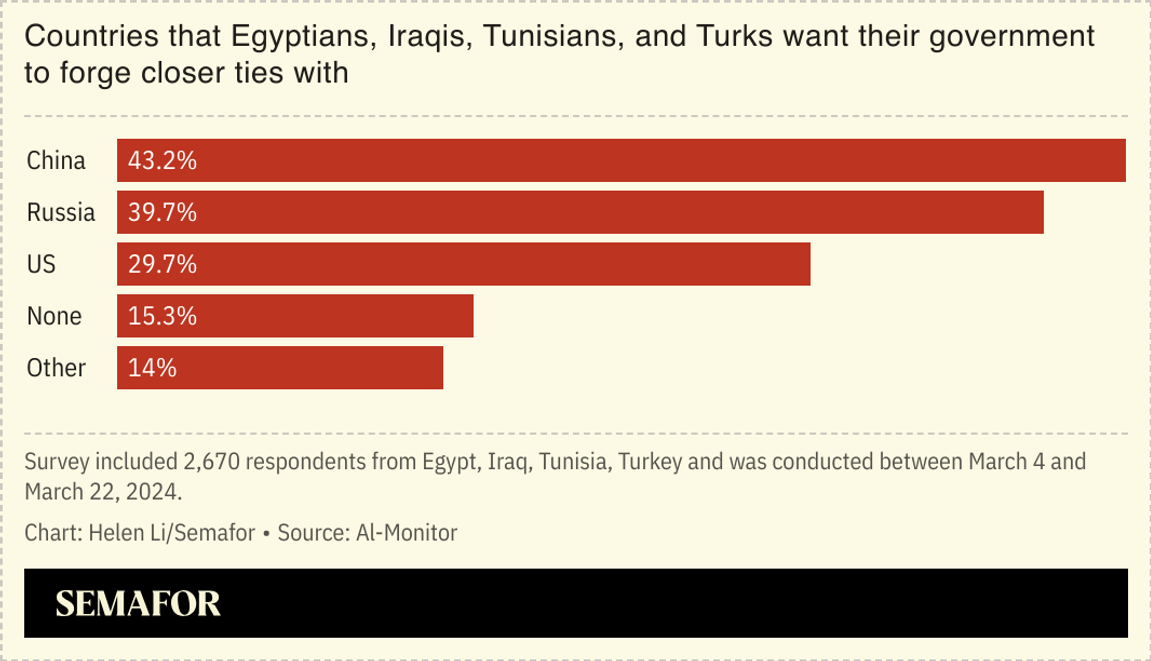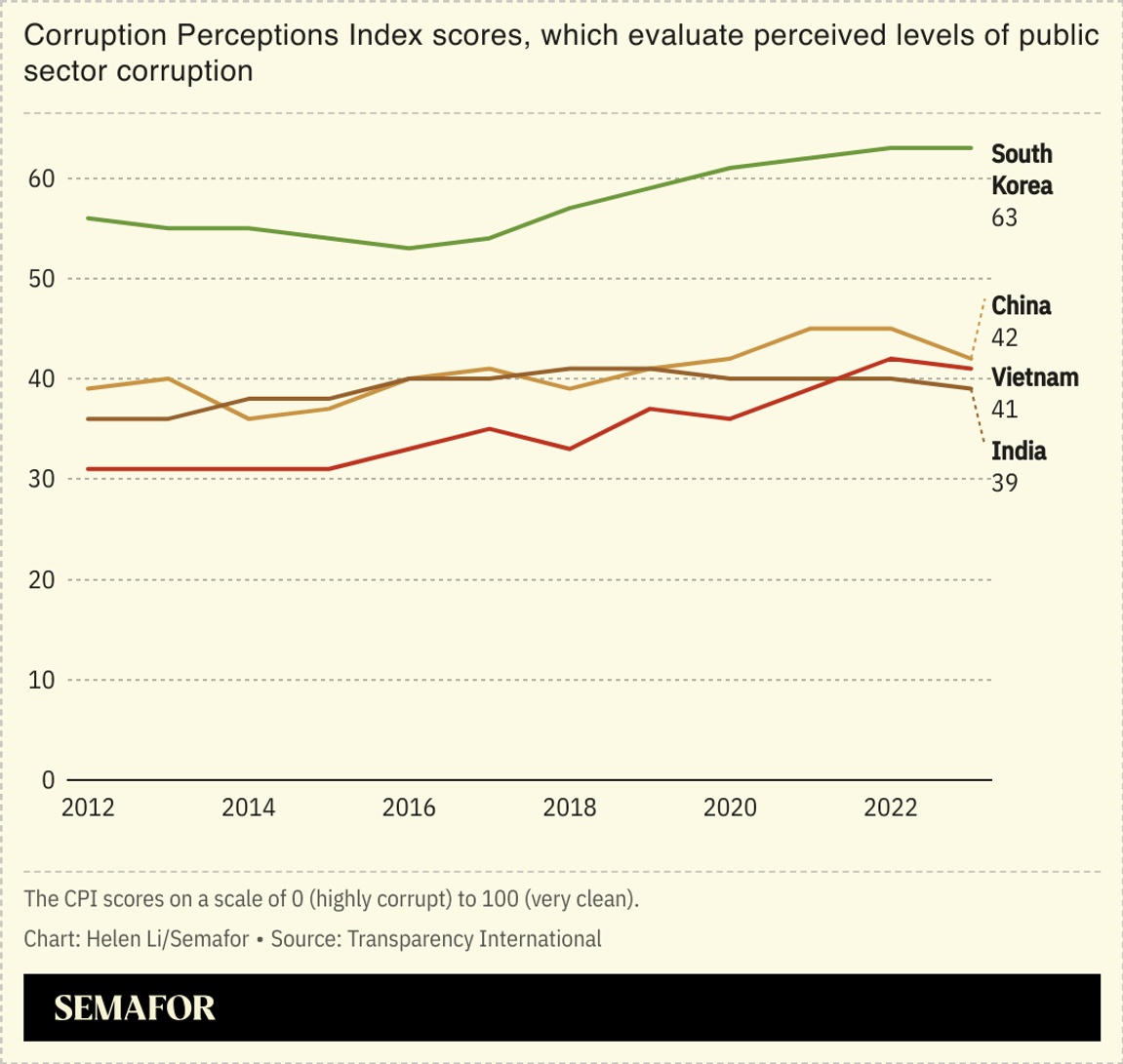| | The US is losing clout in the Global South, Alexei Navalny’s memoir will be released this year, and ͏ ͏ ͏ ͏ ͏ ͏ |
The World Today |  - Israel braces for attack
- Kyiv’s conscription law
- Navalny’s memoir
- Global South attitudes shift
- Vietnam tycoon sentenced
- Meta’s new chip
- Harvard reverses test policy
- Corporate stadiums
- O.J. Simpson dies
- Salmon’s big return
 The Fender Stratocaster guitar turns 70, and our latest Substack Rojak. |
|
Israel on alert for Iranian strike |
 REUTERS/Ronen Zvulun REUTERS/Ronen ZvulunIsrael is bracing for an attack from Iran or its proxies, and already has plans to retaliate against Tehran. “Anyone who hits us, we hit them,” Israeli Prime Minister Benjamin Netanyahu said Thursday, as the head of U.S. Central Command traveled to Israel following warnings from American intelligence that an Iranian attack is imminent. Tehran has publicly threatened retaliation for a suspected Israeli attack in Syria that killed Iranian military leaders. An attack from Iranian soil on Israel “would be unprecedented,” Axios wrote, and risks triggering a regional war. Israel’s air force has recently conducted long-range strike exercises, reportedly practicing for a strike on Iran. |
|
Kyiv passes conscription bill |
 REUTERS/Valentyn Ogirenko REUTERS/Valentyn OgirenkoUkraine’s parliament passed a controversial law Thursday to boost its military manpower, which it’s running short of. The measure includes carrots and sticks: better pay for soldiers and penalties for draft dodgers. Mobilization is one of the most politically contentious issues in Ukraine; Kyiv recently lowered its minimum conscription age from 27 to 25 after a lengthy debate. One provision that would allow troops to end their military service after three years was scrapped, leaving some soldiers questioning their survival on the frontlines. “You can’t take away the soldiers’ hope that they will return home,” an officer wrote on Facebook. |
|
Navalny’s memoir to be released |
 REUTERS/Stringer REUTERS/StringerAlexei Navalny’s memoir, detailing his rise as Russia’s most prominent activist and Vladimir Putin’s fiercest critic, will be released in October, months after his death in an Arctic prison at 47. Navalny began writing Patriot soon after surviving a near-fatal poisoning in 2020, widely believed to be a state-sponsored attack. The project is a “more sensitive endeavor” than most other political memoirs, The New York Times wrote, given the Kremlin’s ongoing scrutiny of Navalny’s family and supporters. One such supporter is 42-year-old Vladimir Kara-Murza who “could be the next Russian dissident to die behind bars,” according to The Wall Street Journal. Like Navalny, Kara-Murza’s nerves are dying due to two poisoning attacks, as he serves a 25-year-prison sentence for criticizing Russia’s war in Ukraine. |
|
US losing clout in Global South |
 Parts of the Global South appear to be getting fonder of China and less so of the U.S. An Al-Monitor poll found that people in Egypt, Iraq, Tunisia, and Turkey would prefer their country to align with Beijing over Washington, echoing similar sentiments from Southeast Asian decision-makers in another recent survey. The shifts are partly due to short-term perceptions “that the U.S. government has been hypocritical over Israel’s war in Gaza and lacks a compelling global vision for the future,” as well as a deeper “disillusionment with the ‘U.S.-led international order,’” the U.S.-based China Digital Times wrote. “China is happy to exploit this advantage either way.” |
|
Vietnamese tycoon sentenced to death |
 One of the richest women in the world was sentenced to death Thursday in a $12.46 billion fraud case, the largest in Vietnam’s history. Real estate tycoon Truong My Lan was accused of siphoning off billions of dollars from a bank she effectively controlled, and bribing authorities to look the other way. Her prosecution was part of a major government-led anti-corruption campaign; hundreds of senior officials and business executives have resigned or faced charges. But the drive has hampered Hanoi’s efforts to attract more foreign investment: Officials are “fearful of making missteps,” leading to delays in contract approvals and the disbursement of funds, The Diplomat wrote. |
|
 Screenshot via Meta Screenshot via MetaMeta unveiled details about its in-house artificial intelligence chip. The Facebook and Instagram owner needs massive amounts of computing power to run AI tools in its products. It hopes the new chip, known internally as Artemis, will reduce its reliance on Nvidia, as well as lower energy costs. Big Tech is uncomfortably aware of its dependence on a few semiconductor manufacturers, notably Nvidia. Google is stepping up its own chip manufacturing, The Wall Street Journal reported, to avoid chip bidding wars with other companies. Google’s CFO told investors in January to expect more spending on AI chips and other technical infrastructure this year. |
|
Harvard brings test scores back |
 Scott Eisen/Getty Images Scott Eisen/Getty ImagesHarvard is bringing back standardized test scores, reversing a pandemic-era admission policy. The college previously said it would remain “test-optional” through 2025-2026, but applicants hoping to begin next fall will now have to submit SAT or ACT scores. Harvard is the latest Ivy League college to drop the test-optional rule, after Dartmouth, Yale, and Brown. Critics of standardized tests argue that they fuel inequality, because students from wealthier families can pay for tutoring. But newer research suggests they could actually be a good predictor of success at elite universities, especially for students from marginalized backgrounds. |
|
 We’ve got some exciting additions to the list of speakers at the World Economy Summit, including Jeremy Hunt, UK Chancellor of the Exchequer; Gina Raimondo, U.S. Secretary of Commerce and Former U.S. Treasury Secretary Larry Summers. Join us in Washington, D.C. next week, on April 17-18, to hear from some of the world’s most influential economic and business decision-makers on the future of global economic growth, the rising middle class, digital infrastructure, AI, and much more. |
|
This stadium is brought to you by… |
 Hard Rock Stadium. Al Bello/Getty Images Hard Rock Stadium. Al Bello/Getty ImagesU.S. sports stadiums are increasingly named for corporate sponsors. In the early 1970s, 97% of stadiums in the NHL, NFL, NBA, and MLB were either named for their team or location, or after an individual. Now 87% have sold naming rights, Sherwood reported, hence the Dallas Cowboys’ AT&T Stadium or the Miami Dolphins’ Hard Rock Stadium (formerly Sun Life Stadium, formerly Land Shark Stadium), as businesses look to sport for exposure and teams look to businesses for revenue streams. Banking and finance companies have led the charge, accounting for nearly 30% of all stadiums. Similar stories play out around the world: There’s the Bargain Booze Stadium in Northwich, England, and the Tony Macaroni Stadium in Livingston, Scotland. |
|
O.J. Simpson dies from cancer |
 REUTERS/Isaac Brekken/Pool REUTERS/Isaac Brekken/PoolO.J. Simpson, the former American football star who gained worldwide infamy after being accused and ultimately acquitted of killing his ex-wife and her friend in 1994, died from cancer on Wednesday at age 76. Simpson’s globally publicized murder trial changed the media and cultural landscape for high-profile cases, foreshadowing the “tabloidization of the media and the insatiable appetite for celebrity news,” The Washington Post wrote in 2014. The case sparked a nationwide debate around race, with polls showing a racial divide over Simpson’s perceived guilt. He was later found liable for the deaths in a civil suit, and was convicted on armed robbery and kidnapping charges in Las Vegas in 2007. |
|
Extinct salmon return to rivers |
 Jeff J Mitchell/Getty Images Jeff J Mitchell/Getty ImagesAtlantic salmon are spawning in rivers in central England for the first time in 100 years. Centuries of industrial pollution in River Derwent, and other nearby rivers, meant that salmon — which live their adult lives in the ocean, but return to the rivers of their birth to breed and die — were driven extinct. River restoration has made the water bodies clean enough for salmon to survive now, and dams and weirs built since the Industrial Revolution have been removed or routed around. One weir was replaced with rapids, allowing the fish to continue further upstream. The salmon “became sort of local celebrities,” one conservation worker said. “People were going out with their head torches at night” to see them. |
|
 - April 12: U.S. Steel shareholders vote on its proposed sale to Japan’s Nippon Steel.
- April 13: Cambodia celebrates the Khmer New Year with music, tug-of-war games, traditional dancing, and water spraying.
- April 14: The U.S. ambassador to the United Nations travels to the heavily militarized Korean border to meet defectors in South Korea.
|
|
 The percentage of U.S. employers who think they are “thriving,” compared to 48% of self-employed workers. A new Gallup report showed how wellbeing and wealth are linked to entrepreneurship and management status. The median income of business owners who have employees is nearly five times higher than those who don’t. The report also revealed racial disparities: Near three-quarters of Black business owners said they had difficulty acquiring financing in the last year, compared to 40% of white owners. |
|
 Rojak is a colloquial Malay word for “eclectic mix,” and is the name for a Javanese dish that typically combines sliced fruit and vegetables with a spicy dressing. Anime music muted Anime music (also known as anisong) took off globally in the 2010s, but new data shows that the output of anime music fell last year to a 25-year low, comprising just 6.5% of new record releases in Japan. Anime music revenues in Japan have fallen about 25% since 2016. Ironically, the mainstreaming of anime music may have caused it to lose momentum, Richardson Handjaja suggests in his newsletter Animenomics. Popular artists began making music “adjacent to anime culture” that plays off the aesthetics of anime in different genres. “As anime music diversifies from specialists to performers who cross genres, fewer releases are specifically categorized as anime-related.” We come to this place for magic Moviegoers tend to enjoy movies more in a theater than at home, according to a two-decade analysis of data, which found that audiences rated movies 2% to 5% higher when they were in theaters vs. after they ended their theatrical run. The effect — which could partly be because fans of a movie or franchise are more likely to see them in theaters — is particularly pronounced with big-budget blockbusters, family films, and comedies: “Perhaps there is added value to laughing as part of a crowd,” Daniel Parris wrote in his data-centric culture newsletter Stat Significant. Simultaneously, entertainment giants have begun rolling out big-budget television shows that are only available to stream at home. “Such convergence has muddied our conception of the cinematic, as it’s become increasingly difficult to comprehend which medium best supports a given piece of content,” Parris wrote. The tiny enjoyment boost of moviegoing might not be worth the extra cost and effort of going to a theater, but for Parris, “this incremental 2% to 5% means the world to me.” The ‘chowmein-ification’ of 3 Body Problem Can 3 Body Problem on Netflix be considered a true “Chinese” cultural export, or primarily a big-budget American series? The show is an adaptation of Chinese author Liu Cixin’s sci-fi trilogy, but “it wasn’t Chinese,” Cindy Yu, the host of The Spectator’s Chinese Whispers Podcast, told Sinica’s Kaiser Kuo. Yu compared the show to Chinese takeout food in the West; “it’s a pale imitation of what you would get inside China.” The Netflix adaptation lacks the “grittiness” of a Chinese adaptation that came out last year and that was much longer, slower paced, and low-budget. It also relocates some of the scenes outside of China. She did grant that in the Netflix version, “the Chinese parts were really, really good,” Yu said. The Mandarin was authentic, and the dialogue correctly incorporated some chengyu, or Chinese idioms.
|
|
 VALERIE MACON/AFP via Getty Images VALERIE MACON/AFP via Getty ImagesThe Fender Stratocaster turns 70 this spring. The iconic and instantly recognizable electric guitar has been associated with legends like Nile Rodgers and Bonnie Raitt, but wasn’t popular when it first appeared in stores in 1954. It wasn’t even available in the U.K. That changed in the 1960s when Jimi Hendrix was “rarely seen playing anything but a Strat.” Millions of people have learned to play guitar on a Strat, in part because of its sonic range. “What does a Strat sound like?” The Guardian asked. “Anything you want.” |
|
| |